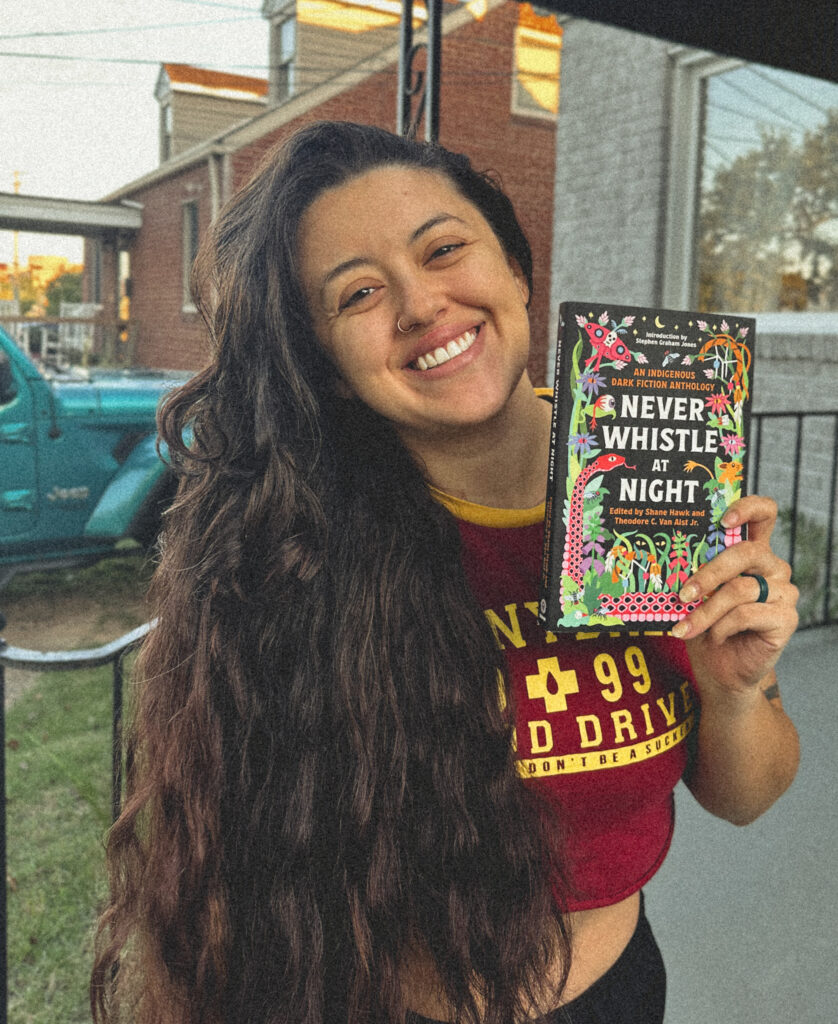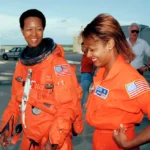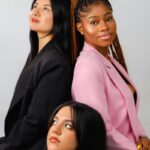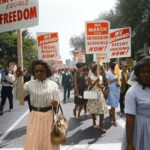The Bay Area Book Festival is celebrating its 10th anniversary this year June 1-2 and will feature several Latina authors, including Dani Trujillo. I had the pleasure of speaking with Ms. Trujillo about her books, her experience as an up-and-coming Latina author, and what we can expect from her at this year’s festival. This will be her first time participating in the festival and she will be in a couple of panels. We also chatted about how important it is for big festivals like this one to promote diverse authors such as herself.
Your debut novel, Lizards Hold The Sun, received acclaim for its portrayal of Indigenous Mexican romance. What inspired you to write the story?
It was just a book that I wanted to read but didn’t exist. And that was really it. And the characters kind of just built themselves up from little bits of people that I know, and little pieces of fiction here and there. I worked in archaeology, and I don’t work in archeology anymore. So, it was my vision of a fantasy world and [the] perfect little hallmark romance type of thing.
How did you navigate and incorporate your cultural heritage into this writing?
People, food, and point of view. Worldview is really important when you’re talking about different cultures because we all see the world differently. We were raised differently. I think that’s a big part of it…I would ask myself: Does this play into any stereotypes, or how would a 6-year-old feel if they were watching this or reading this? Not like the sex scenes, but the pieces about characters and things like that. So, I tried to just really look at it from that point of view, a child of that culture, and how they would feel in my portrayal. And that’s how I navigated myself through it. And then I had a ton of close friends and family who read it for me, and they would help me out with any of those kinds of things, which was definitely a huge help.
Love that! You’re getting your community involved in it as well. That’s beautiful. How long have you been a fiction writer?
Professionally, since last year, but I’ve written for a long time, ever since I was a kid. I definitely wrote really terrible songs. Things like little short stories. I never really submitted into school newspapers, or did anything like that. So, it’s always [been] just a little hobby up until last year. So, I always wrote, and then I went to college and did tons of academic writing just over and over again, and then, now that I don’t work in report writing anymore, I have a lot more time to write the fiction stuff. And I really like that. So, I’m hoping to write more. I’m a little bit slow at it right now, trying to get a little bit faster.
As a Latina author, what challenges have you faced in the publishing industry, and how did you overcome them?
I think being self-published is helpful for sure… So, I think the main challenge for me was just with the first book in the editing. I hired an Indie company, and I had two editors, they were both white women, which is not a bad thing, but they didn’t feel comfortable asking me questions, and because of that, my editing was not what it could have been, or what it should have been. I definitely know that I did not get the same experience that probably their white writers do. But, because there were things they didn’t understand, they didn’t ask, and they would leave comments that wouldn’t have been necessary. They’d ask me a question or just nitpick at some things because they didn’t understand it. With the second book, I have an Indigenous editor, and she’s who I’m working with going forward. And, it’s been a lot better.
Yeah, that’s awesome! Representation really makes a difference. Your work often addresses these themes of identity and love. So how do you believe your perspective as a Latina author enriches those narratives?
I think I have a little bit of a unique perspective, just being Mexican and Indigenous, being raised here in the U.S. and then, I was raised in Vegas. So, in an urban community, not on rez (reservation). I’ve met a lot of people… I’m really good at making things make sense to other people without changing things. I won’t say without diluting, because there [are] times where it’s not appropriate to share a full story with an outsider. I think that moving through all of these different cultures for so long makes me able to translate it into writing a little bit easier.
And then, as far as my personal culture, in the Pueblos, we’re a little bit private. And so, even though other nations aren’t like that, that’s how I approach writing. So, there’s certain things that wouldn’t be on the page or certain things that I wouldn’t explain fully. I think the big one that the white editors and then some non-Indigenous reviewers have said was when they excavated the mound, and I did not talk about what was inside it. I didn’t talk about where they put it, or what they did. And that’s a respect thing for me, it’s not appropriate. That’s not what the book is about, one, and second, it’s just not appropriate. And so, a lot of people are like, “No, I want to know what’s inside there,” And I was like, “Well, you don’t get to.” That’s just how it is.
And then, as far as love and romance…I think the main thing is that I don’t want to be stereotypical, and I don’t want it to be toxic. So, I try to think things through. And then, even with Chief Thomas being a villain, I also couldn’t have him be such a villain to the point he was irredeemable or a really bad person. Because, how dare I make the only Black Indigenous character a really bad person? It was a lot of just thinking things through, trying to look at multiple perspectives. And trying really hard not to be toxic. I think dark romance and everything like that is fine. I don’t have a problem with it, but with contemporary romance, and knowing just how many non-Latin, non-Indigenous people are going to read the book, I don’t want them going around telling people,” Oh, Mexicans are so crazy in their relationships, the novelas are true, and they’re always pointing guns at each other,” I don’t want that.
Yeah, definitely! It’s really great that you’re this safe bridge between different cultures and you take such care with that. Can you tell us about your writing process, and how you develop your characters and storylines?
I think I’m still really developing my writing process. I hope one day I have it down pat and figured out, but right now with Lizards, It’s a lot of discovery writing. I was writing it out of order and started with Xiomara and Calehan, and a bunch of scenes of them together, and then branched out to their individual scenes and the rest of the story from there. And then the second book obviously was so different, because I already had Buffy at least somewhat established and they were such different characters. I feel like they were secretive little characters. They didn’t want to tell me things. So, my writing process has been different both times, but I think a lot of what I do is: I start scenes with my main couple speaking to each other, and I discover who they are from there. I try to plot characters ahead of time. Sometimes I don’t know who they are right away, and it takes a little time. Then, I try to draft in six months. It’s not always what happens, and then the rest of the process is another six months for editing.
Awesome! What advice would do you have for the aspiring Latina authors who want to share their stories with the world?
My gosh! I would say, don’t give up. Obviously, I think everyone says that. No matter your age, you don’t need to be young, but you also don’t need to be old. You don’t need to have 60 years of wisdom to write a book and stay true to yourself as much as you can. If you go the traditional publishing route, have things you’re willing to compromise on, things that you’re not, and just stick to your guns and do whatever you want to do. You want your characters to speak Spanish without translation? Then have them do it. Don’t give up and just keep writing. Don’t ever stop writing and write anything and everything. Whatever you want, every idea you have.
That’s great advice! So, The Bay Area Book Festival is celebrating diversity and inclusivity. How important is it for events like this to showcase voices from different backgrounds?
Oh, my gosh, definitely super important! It’s really hard to get into events like these. Typically also, self-published authors like me are not welcome. I think me being published in the Never Whistle at Night anthology helped with that. But the Bay Area book fest did ask me to also speak on the romance, which is published by myself. So, I think that’s really exciting. And it’s really cool that they’re letting me do that, because for a lot of us there’s a ton of Latine and Indigenous authors that are traditionally published, but most of us are not. So, to be able to expand that, even with just one or two people a year at a festival, is really amazing. I’m really glad that they’re doing it. I’m nervous and excited. I’ve never been to a book festival like this before, so I think that’s also cool. Hopefully, there will be people who’ve not gone to a book festival and see that I’m going to be there. Maybe, they’ll come for me. That’d be really cool.

I’m sure that would be very insightful and you’ll have a great point of view! What can the readers expect from your upcoming projects or appearances at the Bay Area Book Festival?
So, at the festival, I’ll be doing their horror panel and their romance panel. Then, I will be spending time at the festival, too, just walking around and stuff. So, if people are there and they wanna bump into me, go ahead and show up and DM me on Instagram, and we can meet up! As far as upcoming projects, right now, I’m working on book three for the Yellowbird siblings. So, that is following Clyde, I’m really excited to get back to a Yellowbird boy, which is where I started and this one’s gonna be set in Hawaii… There’s gonna be, some talk about colonialism, some talk about tourism and the ethics there. There’s gonna be a lot of discussion on classism, because you can’t really go to Hawaii and not talk about classism and of course, my main character. She’s Mexican and Samoan. So, don’t worry. That’s what I know. So, I have to write characters that have at least something that I know. And so I’m really excited for that one. I can’t wait for it to come out. I feel like Lizards and Stars has done really well. I’m really proud of how well they’ve done, and I’m by no means wealthy. I haven’t actually turned a profit yet. But, I sold a lot of copies in multiple countries, and I’m in a lot of libraries. And for me, that feels like success.
That is so cool! How do you think events like the Bay Area Book Festival contribute to the literary community, especially in terms of promoting diverse voices?
I think it’s really cool, especially for kids or people in an area. I think Berkeley is a cool place to host it. I think even maybe, somewhere like Oakland, would be cool one year, or if Oakland had their own festival in the future. I think making reading fun and exciting is important. Our literacy levels are continuing to drop in the United States, and that’s not just a problem in terms of wanting people to read my books and buy my books, but being able to read and digest news and understand our insurance plans and the contracts we’re signing in our rental agreements. And all of these things like reading are just fundamental. So, I think these things are really important, and by bringing in diversity, it brings in other people in the community that feel excluded. We talk about how children’s books have more animal main characters than Indigenous or Latine, and that’s crazy! Of course, these kids aren’t feeling necessarily welcome into the reading world. So, I think bringing in that diversity and doing it at a free festival, located in downtown Berkeley, I think it’s really cool, and I hope that it brings in a bunch of people and gets people excited and wanting to read from all different backgrounds and walks of life.

What message do you hope your work leaves on your readers, and particularly those from similar cultural backgrounds?
For those from similar cultural backgrounds, I really want them to feel seen or represented and not necessarily like every main character. I have people who say they really identify with Rosebud or they really identify with Juniper. So, I hope they feel seen or presented, or even that they see a family member in the book, or a friend or someone they know, and they feel inspired to write or to read more, or to turn my book into a film, if they want. When it comes to other cultural backgrounds, I hope that they can learn a little bit of respect, and some understanding. Maybe they learn that they don’t need an answer to every single question. That it’s okay to just not know. I hope little Latina girls read someone like Xiomara, and want to become an archaeologist or something like that. I still love archaeology, I don’t work in it anymore, but I love it, and I would love for more Latinas to be archaeologists and to work in the field.
Do you have any last things you want to say about your work or experience in your career?
Thank you for interviewing me and letting me have an article in Latinitas. I’m excited! I hope that I can inspire some young girls, and maybe some viejitas tambien! If people want to keep up with me, they can follow me on Instagram, or sign up for my newsletter, and I’m always around. I hope to continue to write for the rest of my life, regardless of if I ever get big or not, it’s something that I love. So, I hope that I can write forever. I’m hoping to branch out. I really do want to write some children’s books. Maybe some middle grade in the future. So, keep an eye out for that, and for the little Latinitas, I’ll have something for them, eventually. I just had to get my girls first.
I hear that! Awesome. Thank you again!











